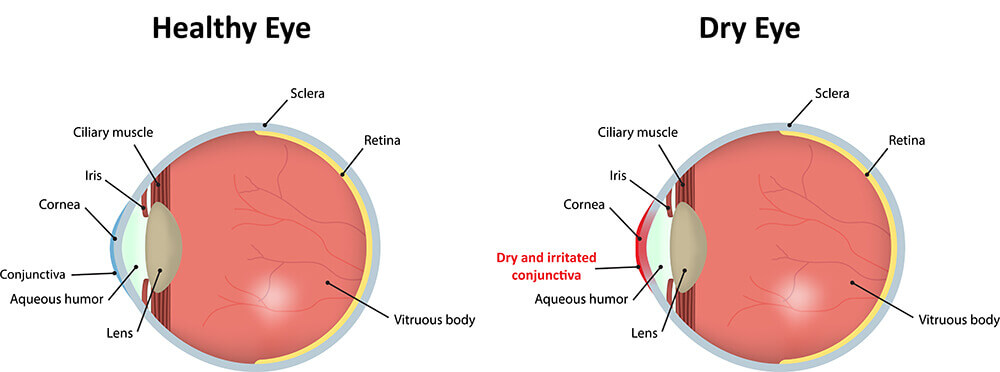Do you have dry, itchy eyes that feel irritated and look red? Does it feel like there is sand or grit between your eyes and your eyelids?
These are common symptoms of a condition called dry eye syndrome. For many people, the only way to find relief from these symptoms is to seek treatment. At Nevada Eye Physicians, our eye doctors have extensive experience treating and diagnosing patients with this condition.

What Causes Dry Eye?
The main reasons that people have dry eyes are because they do not produce enough tears, or the tears they do make are low in quality. Healthy tears have three components: oil, water, and mucin. Tears missing any of these vital components are unable to deliver necessary nutrients to the eye. Other reasons that people develop dry eyes include their environment, age, and even their lifestyle.
People over the age of 50 are more likely to have dry eyes because they don’t produce as many tears. Conditions like rheumatoid arthritis and lupus can also limit your tear production.
If you wear contact lenses, you may develop symptoms of dry eye syndrome. It’s essential to follow directions on how long to wear them to prevent discomfort. Always throw away disposable contacts as directed.
Medications such as antidepressants and birth control commonly reduce tear production. Antihistamines and decongestants are also risk factors.
Talk with your doctor if you are taking medications that have dry eyes as a side effect. Your physician may change your dose or recommend using eye drops.
Meibomian gland dysfunction (MGD) occurs when the meibomian glands make or give off less oil. You need the oil from these glands to keep tears from evaporating.
If your meibomian glands aren’t producing enough oil, it can make tears evaporate faster and cause dry eyes. You may have MGD if your glands are clogged. Those over age 50 have a higher chance of developing this condition.
Is Dry Eye Syndrome Dangerous?
Lack of tears can make you vulnerable to eye infections. Tears protect the surface of the eye from irritants like pollen and dust.
Inadequate lubrication could make you susceptible to scratching the surface of your eye. You may struggle to read or focus your eyes if they are too dry.
Waking up in the morning and driving may also be affected. Severe dryness can negatively impact your quality of life.
How Can I Treat Dry Eyes?
People with mild dry eyes can relieve symptoms with over-the-counter eye drops. These solutions lubricate the eye and prevent dryness.
Those who wake up with severe dry eye symptoms can use a moistening gel when they go to bed. The thicker consistency lubricates and repairs the eyes during sleep.
How Can I Avoid Having Dry Eyes?
Many people have dry eyes during the winter months. Heaters dry out the air, making your tears evaporate faster.
If your eyes feel dry, there are things you can do to combat dry eye symptoms at home. Try the following ideas:
- Use a humidifier to add moisture to the air
- Always wear sunglasses to avoid exposure to UV rays from the sun
- Use artificial tears if your eyes feel dry or if you’re in dry places like deserts and on airplanes
- Take breaks from your computer to look away from the screen. After 20 minutes of screen time, look at something that’s 20 feet away for 20 seconds. This break can limit eye strain and improve lubrication.
- Smokers have a heightened risk of dry eye. Quit smoking if you haven’t already.
Concerned about dry eye symptoms? Schedule an appointment at Nevada Eye Physicians in Las Vegas, NV, today!





